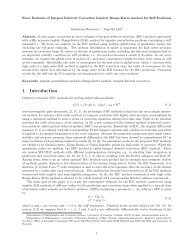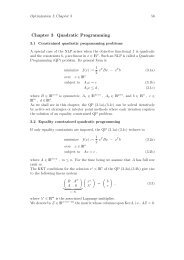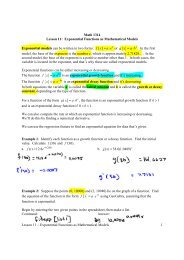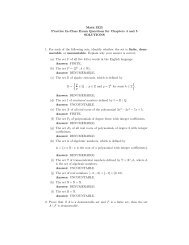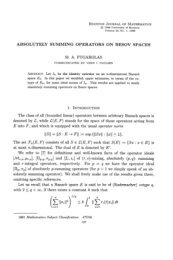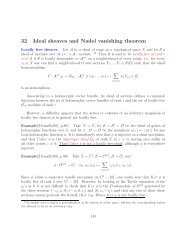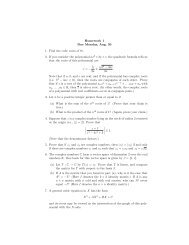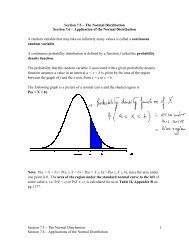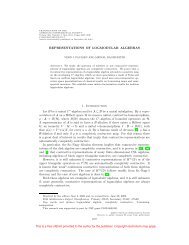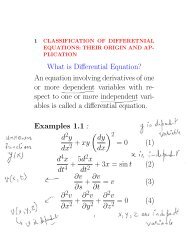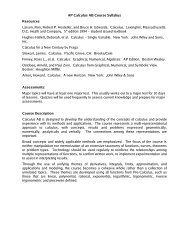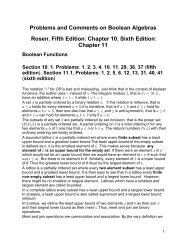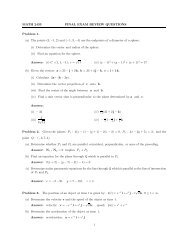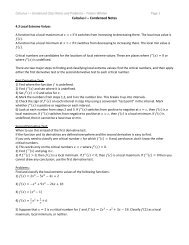Survey 1979: Equational Logic - Department of Mathematics ...
Survey 1979: Equational Logic - Department of Mathematics ...
Survey 1979: Equational Logic - Department of Mathematics ...
You also want an ePaper? Increase the reach of your titles
YUMPU automatically turns print PDFs into web optimized ePapers that Google loves.
2 EQUATIONAL LOGIC<br />
2. The existence <strong>of</strong> free algebras. Let V be any class <strong>of</strong> algebras <strong>of</strong> fixed type.<br />
By definition a V-free algebra on the set X (denoted Fv(X)) is an algebra B =<br />
(B,Ft)t- T such that<br />
(1) B c V;<br />
(2) X c_ B;<br />
(3) if A c V and 0: X-+A is any function, then there exists a unique<br />
homomorphism : B -+ A with ] X = 0'<br />
One easily checks that if B and C are each V-free on X, then there exists a unique<br />
isomorphism : B-+ C with the identity on X. (Thus we may say "the" V-free<br />
algebra on X.)<br />
THEOREM. [48]. If V is any non-trivial class <strong>of</strong> algebras closed under the<br />
formation <strong>of</strong> subalgebras and products, then Fv(X) exists for every X.<br />
A pro<strong>of</strong> can be found in any <strong>of</strong> our references on general algebra. Birkh<strong>of</strong>f's<br />
original pro<strong>of</strong> has been abstracted in category theory to yield the "adjoint functor<br />
theorem." See e.g., [ 143, page 84]. For some other adjointness results on classes V see<br />
e.g., [432] and [346, pages 148-149]. Such generalized free objects (e.g. tensor<br />
algebras and universal enveloping algebras) were important in Lawvere's development<br />
<strong>of</strong> an invariant approach to this subject (see õ 7 below).<br />
Familiar examples <strong>of</strong> free algebras are free groups and free AbelJan groups. Thus<br />
in some (but not all) cases, elements <strong>of</strong> free algebras can be written as "words." (We<br />
will return to this point in õ 12 below.) This more concrete description <strong>of</strong> free algebras<br />
has also caught the attention <strong>of</strong> category theorists; see e.g. Gray [ 170].<br />
It is unclear whether there is a successful generalization <strong>of</strong> the Theorem to more<br />
general classes V. Gratzer [ 163, Chapter 8] proposed such a generalization for classes<br />
V defined by a set 22 <strong>of</strong> first order sentences. But unfortunately his "free algebra" was<br />
not independent <strong>of</strong> the choice <strong>of</strong> axiomatization [Colorado <strong>Logic</strong> Seminar, Spring,<br />
1969, unpublished].<br />
Perhaps the most remarkable recent result on free algebras is Shelah's [397]: if 3,<br />
is a singular cardinal, every subalgebra <strong>of</strong> A with < 3, generators is free, and A has<br />
cardinality 3,, then A is a free algebra.<br />
Notational convention henceforth: K is the class <strong>of</strong> all algebras <strong>of</strong> the fixed type



